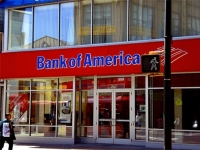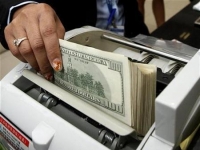Business
U.S. Warns Banks Off Russian Bonds.
U.S. Warns Banks Off Russian Bonds.

U.S. Warns Banks Off Russian Bonds (Source: www.pbs.org)
USPA NEWS -
U.S. Warns Banks Off Russian Bonds.
The U.S. government has warned some top U.S. banks not to bid on a potentially lucrative but politically risky Russian bond deal, saying it would undermine international sanctions on Moscow, people familiar with the matter said.
The U.S. government has warned some top U.S. banks not to bid on a potentially lucrative but politically risky Russian bond deal, saying it would undermine international sanctions on Moscow, people familiar with the matter said.
The move, apparently the first of its kind since the sanctions went into effect, has sent Wall Street bankers scrambling to determine whether the opportunity for new business is worth the political downside of bucking the administration´s warning. The rules don´t explicitly prohibit banks from pursuing the business, but U.S. State Department officials hold the view that helping finance Russia would run counter to American foreign policy.
Russia plans to issue at least $3 billion of foreign bonds“”its first international issue since the U.S. and its allies imposed sanctions in 2014 following Moscow´s annexation of Crimea and support for separatists in Ukraine, according to people familiar with the matter.
Russia invited European and Chinese banks to bid on the deal as well as several from Wall Street, including Bank of America Corp, Citigroup Inc., Goldman Sachs Group Inc., J.P. Morgan Chase & Co. and Morgan Stanley, the people said.
So far, there is no consensus among the Wall Street firms about whether to move ahead. Some bank officials, including at Citigroup, say they won´t participate. Other banks, including Goldman and J.P. Morgan, continue to weigh their options.
Officials at the State Department and Treasury Department issued the caution in response to questions from some of the banks about whether they were permitted to arrange a bond sale for Russia.
U.S. government officials say helping Russia finance its debt would run counter to the objectives of the sanctions.
“It is essential that private companies“”in the U.S., EU and around the world“”understand that Russia will remain a high-risk market so long as its actions to destabilize Ukraine continue,“ the State Department said in a statement to The Wall Street Journal. The State Department also warned of “reputational“ risks of returning “to business as usual with Russia.“
American banks had made inroads into the Russian market, setting up offices there and pitching for deals. Since 2002, U.S. banks have collectively captured roughly a quarter of annual Russian investment-banking revenue on average. In 2007, U.S. banks did nearly $630 million of more than $2 billion in investment-banking business in Russia, but that amount dropped to $26 million last year after the sanctions took effect.
J.P. Morgan has been among the more active U.S. banks in Russia, though its business in the country has always been a small part of the overall picture. In 2015, J.P. Morgan made more than any other U.S. bank in investment-banking revenue, though the amount was only $9 million, according to Dealogic.
Still, Russian business has mostly been at a standstill. Banks have cut the size of their staff in Moscow or closed operations in the past year.
ENLARGE
Russia last issued foreign bonds in 2013, a record year with $11.4 billion in total, according to Dealogic data. Russian bonds have been strong performers. Last year, they delivered a total return of 21.1% for investors, making them one of the top performers among 65 emerging countries that J.P. Morgan tracks.
The Obama administration´s guidance comes at a particularly sensitive time in U.S.-Russia relations due to the continuing civil war in Syria. The White House and Kremlin have closely cooperated in fashioning a cease-fire in Syria that is supposed to go into effect Saturday.
But U.S. officials are skeptical Russia is serious about enforcing an end to hostilities. Moscow has intensified military operations in Syria in recent weeks in a bid to strengthen President Bashar al-Assad, Russia´s closest Middle East ally.
While the U.S. has applied sanctions against major Russian companies and individuals, it hasn´t taken the more radical step of imposing broader sanctions on sectors of the Russian economy such as energy and banking, or blocked the entire government.
Some U.S. officials are pressing for Washington to impose new sanctions on Russia if it doesn´t abide by the cease-fire agreement. The selective sanctions now in place have scared away Western investment banks anyway, as has the U.S. government´s behind-the-scenes lobbying against doing business in Russia.
Moscow has seen a sharp deterioration in its fiscal health due to the sanctions and plummeting oil prices. The country has also been hit by high inflation and rising unemployment. The Kremlin is already considering cuts to some areas of the federal budget, which relies on oil and gas for half of its revenue.
Any debt arranged between the Russian government and U.S. financial-services firms wouldn´t technically violate the U.S. sanctions. Executives at some of the banks, however, worry that if they participate in the current deal, Russia could then inject the funds into companies currently under sanctions. As a result, the banks could run the risk of inadvertently violating the sanctions in spirit.
Some bank officials believe they were invited to participate by the Russians partly because Moscow wanted to test this loophole, and it could turn into a foreign-policy debacle if Russia later says the sanctions are meaningless because Wall Street banks are still helping them indirectly.
The U.S. and European Union imposed sanctions on Russia in 2014 after it annexed Crimea and supported separatists in eastern Ukraine. U.S. and European investors are banned from buying new debt from several Russian companies that are under sanctions. Even for Russian companies that are free of sanctions, the cost of borrowing in foreign markets has been high.
The Russian bond deal will land at a time when fewer emerging-market countries are tapping international markets, given that the strong dollar and a sharp selloff in bonds from these countries have driven up borrowing costs. According to J.P. Morgan, developing countries are expected to raise $64.9 billion in 2016, a smaller funding need compared with the $82 billion raised by these countries last year.
“”Carolyn Cui and Jay Solomon
contributed to this article.
more information: https://http://www.wsj.com/articles/u-s-warns-banks-off-russian-bonds-1456362124
Liability for this article lies with the author, who also holds the copyright. Editorial content from USPA may be quoted on other websites as long as the quote comprises no more than 5% of the entire text, is marked as such and the source is named (via hyperlink).










